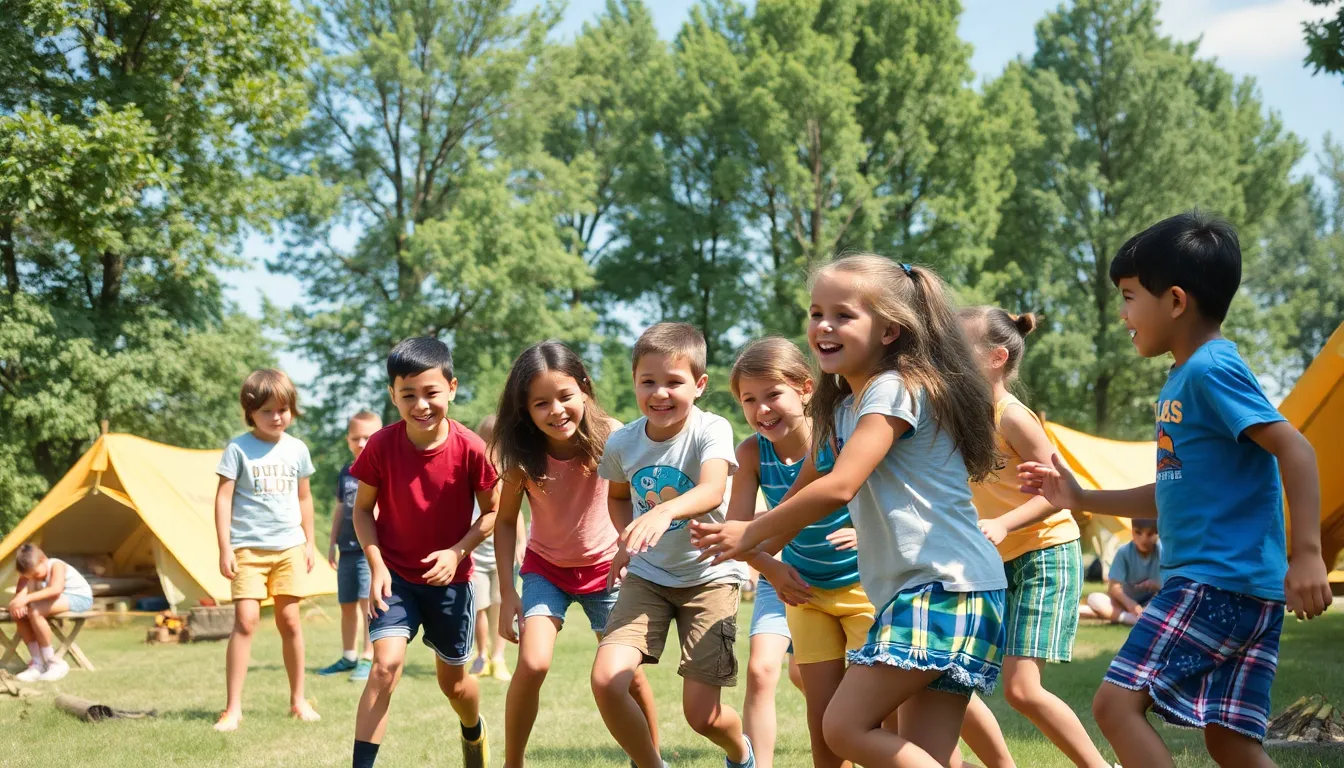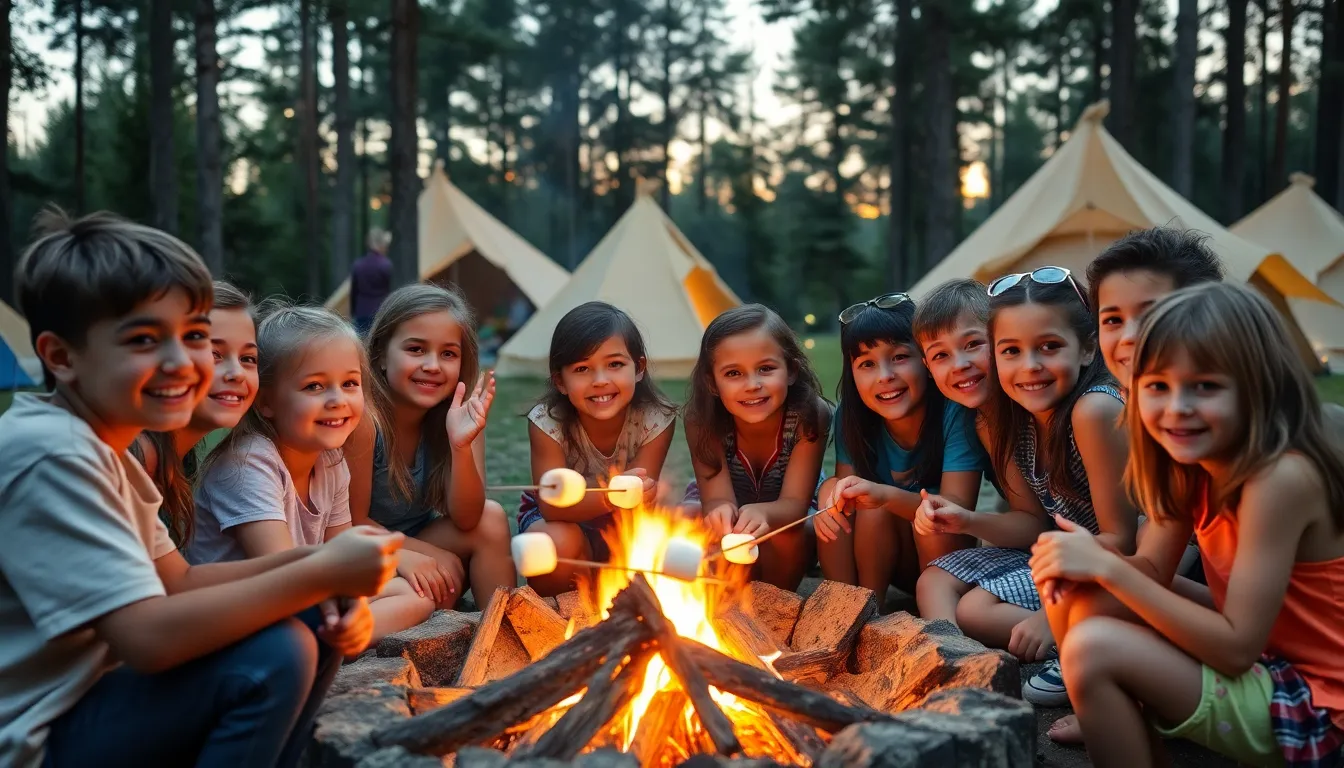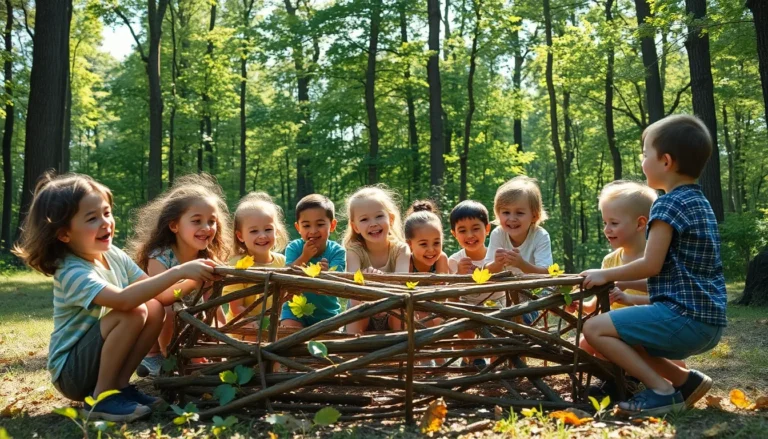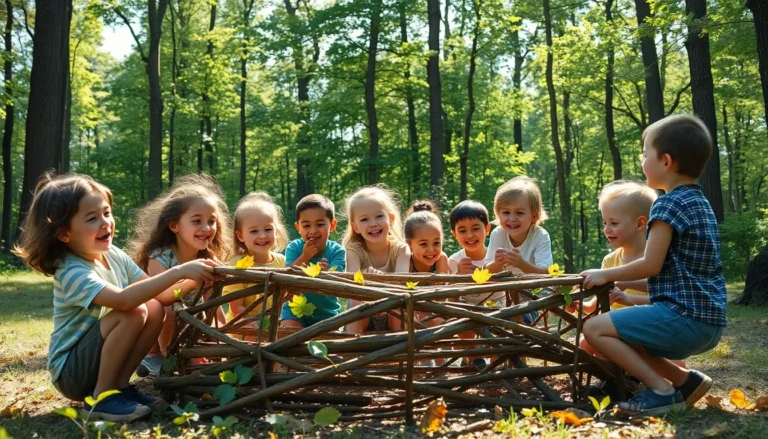Table of Contents
ToggleSummer sleepaway camps are like a rite of passage for kids, a magical escape from the daily grind of homework and chores. Imagine your child trading in their video games for archery lessons and campfire sing-alongs. It’s a chance for them to make lifelong friends, conquer new challenges, and maybe even discover a hidden talent for canoeing or tie-dyeing.
But let’s be honest—it’s not just about the kids. Parents get a much-needed break too! While the little ones are off perfecting their s’mores-making skills, parents can finally enjoy some peace and quiet. With a variety of camps tailored to every interest, there’s something for everyone. So why not send them off for an unforgettable summer adventure? After all, a little independence never hurt anyone, right?
Overview of Summer Sleepaway Camps
Summer sleepaway camps provide children with unique opportunities for growth and adventure. Kids immerse themselves in various activities such as archery, hiking, and campfire sing-alongs. Each camp specializes in different interests, from sports to arts, ensuring there’s a suitable option for every child.
Experiencing camp fosters independence as children learn to navigate new environments. New friendships form as campers bond over shared experiences, creating lasting memories. Children who embrace these challenges often discover hidden talents, from artistic abilities to leadership skills.
Parents gain peace of mind while their kids enjoy these enriching experiences. Many parents use this time to recharge, knowing their children engage in supervised activities with trained staff. The structured setting promotes safety while encouraging exploration.
Camp attendance typically lasts several weeks, allowing for deeper connections among peers. Many organizations emphasize teaching valuable life skills, including teamwork and resilience. Kids return home not only with stories to share but also with enhanced confidence and self-esteem.
Families can choose from day camps or overnight options, each catering to specific needs. Overnight camps often provide a more immersive experience, while day camps offer convenience for families. Evaluating each camp’s qualities helps parents find the best fit for their children’s interests and personalities.
Summer sleepaway camps offer unique benefits that contribute to children’s development. They serve as a memorable backdrop for growth and connection, making the summer a transformative experience.
Benefits of Attending Summer Sleepaway Camps

Summer sleepaway camps provide a multitude of benefits that contribute to children’s development and enjoyment.
Personal Growth and Independence
Children experience personal growth at summer sleepaway camps. They learn to navigate daily routines without parental oversight. This independence helps foster self-confidence and decision-making skills. Campers often face new situations, encouraging them to step out of their comfort zones. Skills acquired during this time often lead to increased resilience and adaptability. Many discover hidden talents and interests through various activities. Whether it’s mastering a new sport or exploring creative arts, each opportunity builds a stronger sense of self.
Social Skills Development
Social skills flourish in the camp environment. Campers engage with peers from diverse backgrounds, enhancing their interpersonal skills. Group activities encourage teamwork and cooperation, essential for building relationships. Children develop conflict resolution abilities through shared experiences, learning to navigate differences. Regular interactions foster lasting friendships, providing invaluable support networks. Many return home with improved communication skills, vital for both personal and academic success. By participating in camp traditions and initiatives, kids strengthen their social competence in a fun and interactive way.
Different Types of Summer Sleepaway Camps
Summer sleepaway camps offer various experiences, catering to diverse interests and preferences. Exploring different types can help parents choose the best option for their children.
Traditional Camps
Traditional camps provide a wide range of outdoor activities. Campers engage in swimming, hiking, and arts and crafts, fostering a sense of community. These camps often emphasize group activities, allowing children to make friends and learn teamwork. Many traditional camps maintain a rustic environment, utilizing cabins and communal areas for gatherings. Staff members usually include trained counselors committed to ensuring campers’ safety and enjoyment. Kids often discover new interests through a balanced schedule that includes both structured and unstructured time.
Specialty Camps
Specialty camps focus on specific interests or skills. Options include sports, arts, music, or science, catering to campers’ unique passions. Each specialty camp often features expert instructors who guide participants. This focused approach allows children to enhance their abilities while exploring in-depth knowledge of their chosen field. Unique activities like coding workshops or theater productions attract campers eager to dive deeper into their interests. Furthermore, the emphasis on skill development nurtures self-confidence and creativity, fostering personal growth in children.
Choosing the Right Summer Sleepaway Camp
Selecting an appropriate summer sleepaway camp involves careful consideration of several factors. Understanding these aspects ensures that children have a rewarding and enjoyable experience.
Factors to Consider
Location plays a crucial role in camp selection. Camps situated in natural settings often provide outdoor activities, while those near urban areas might focus on specialized programs. Camp duration varies, typically ranging from two to eight weeks, allowing families to choose based on their child’s comfort level. A camp’s size impacts peer engagement; larger camps offer diverse activities, while smaller camps foster closer connections. Additionally, reviewing staff qualifications ensures safety and expertise. Each camp’s philosophy should align with family values, whether emphasizing creativity, sportsmanship, or personal growth. Parents should assess facilities to ensure they meet their child’s needs.
Questions to Ask
Inquiring about daily schedules helps parents understand the camp’s routine. What activities are included in the program? Knowing this provides insight into potential interests and allows for engaging experiences. Parents should ask about camper-to-staff ratios, ensuring adequate supervision and support. What qualifications do camp counselors hold? This information verifies the safety and quality of instruction. Parents should also consider communication methods during camp sessions. How often will updates be provided? Understanding this enhances peace of mind. Lastly, reviewing refund policies can clarify financial commitments in case of unforeseen circumstances. Asking these questions aids in finding the ideal camp for their child’s summer adventure.
Preparing for Summer Sleepaway Camp
Preparing for summer sleepaway camp involves careful planning to ensure a smooth transition for children. Attention to packing and emotional readiness plays a crucial role in the overall experience.
Packing Essentials
Packing essentials includes clothing suitable for various activities, personal hygiene items, and necessary gear. Children require comfortable shoes, swimwear, and lightweight layers for changing weather. Include items like toiletries, sunscreen, and insect repellent to maintain health and comfort. Additionally, encourage kids to pack a favorite book or stuffed animal for comfort. Waterproof bags help protect belongings from unexpected rain. Address specific needs such as medications or dietary requirements with appropriate documentation. Camps often provide packing lists, making it easier for families to prepare.
Emotional Preparedness
Emotional preparedness helps children adjust to the sleepaway camp environment. Open communication between parents and kids fosters understanding about the upcoming experiences. Discussing potential feelings of homesickness or anxiety encourages kids to express emotions. Role-playing different scenarios allows them to practice overcoming challenges. Establishing a clear understanding of camp routines promotes confidence. Additionally, reassure children that they are not alone in their feelings, as peers will also face similar emotions. Encourage kids to focus on the exciting activities and friendships awaiting them at camp, reinforcing the value of the experience.
Summer sleepaway camps offer children a unique opportunity for growth and adventure. By stepping outside their comfort zones, kids not only build independence but also forge lasting friendships and develop essential life skills. These camps provide a supportive environment where children can explore their interests and discover new talents.
For parents, the chance to enjoy some time off while knowing their kids are engaged in enriching activities is invaluable. With careful consideration in choosing the right camp, families can ensure a rewarding and memorable experience for their children. Summer sleepaway camps truly create a foundation for lifelong memories and personal development.




